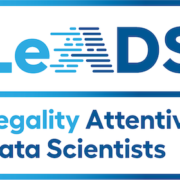LeADS – New MSCA ITN Project to Train Researchers Competent in Law and Data Science

Pisa, January 2021 – LeADS, a Marie Skłodowska-Curie Innovative Training Networks project launched in January 2021, will train 15 researchers competent in both law and data science. The project is funded under the European Commission’s H2020-MSCA-ITN programme.
The emergence of data science has raised a wide range of concerns regarding its compatibility with the law, creating the need for experts who combine a deep knowledge of both data science and legal matters. LeADS project will train early-stage researchers to become legality attentive data scientists (LeADS), the new interdisciplinary profession aiming to address the aforementioned need. These scientists will be experts in both data science and law, able to maintain innovative solutions within the realm of law and help expand the legal frontiers according to innovation needs. The project will create the theoretical framework and the practical implementation template of a common language for co-processing and joint-controlling basic notions for both data scientists and jurists.
LeADS consortium brings together 7 beneficiaries and 8 partners from across Europe and will run for 4 years (2021-2024). The project is coordinated by the International and Comparative Law Research Laboratory (LIDER-Lab) at Scuola Superiore Sant’Anna. The other beneficiaries are the following universities and research institutes: Law, Science, Technology and Society (LSTS) Research Group at Vrije Universiteit Brussel, The Interdiciplinary Centre for Security, Reliability and Trust (SnT) at the University of Luxembourg, Institut de Recherche en Informatique de Toulouse at Université Toulouse III – Paul Sabatier, the Civil Law Department and the Intellectual Property Law Institute at Jagiellonian University, the Department of Digital Systems at University of Piraeus, KDD-Lab at the Italian National Research Council (CNR).
The consortium also involves 8 non-academic partners that will support the practical, hands-on training part of the LeADS curriculum: The Italian Data Protection Authority (Garante per la protezione dei dati personali), the Italian Competition Authority (Autorità Garante della Concorrenza e del Mercato), Intel Corporation, Indra, Innovation Acts Ltd (Innov-Acts), BYTE COMPUTER S.A., Tellu, MMI S.p.A.
Contact details:
Veronica Virdis, LeADS Project Manager
pm@legalityattentivedatascientists.eu




